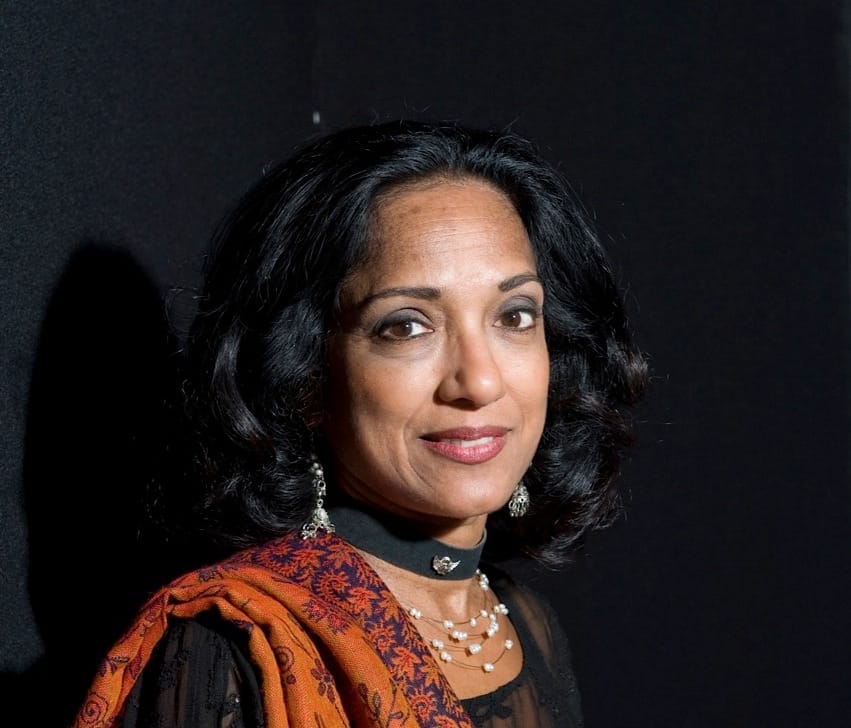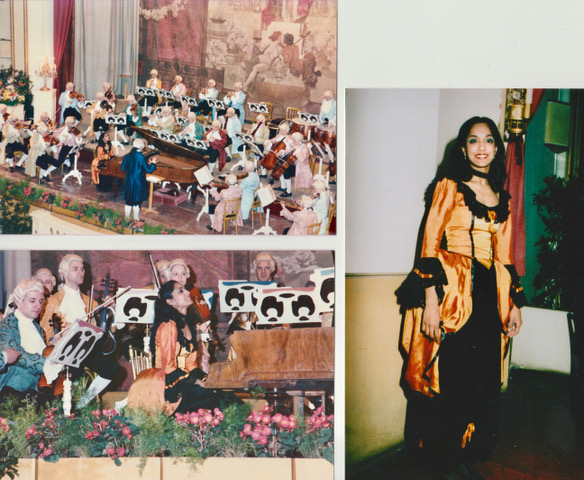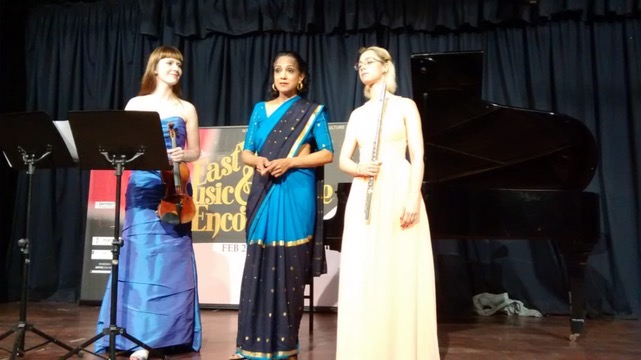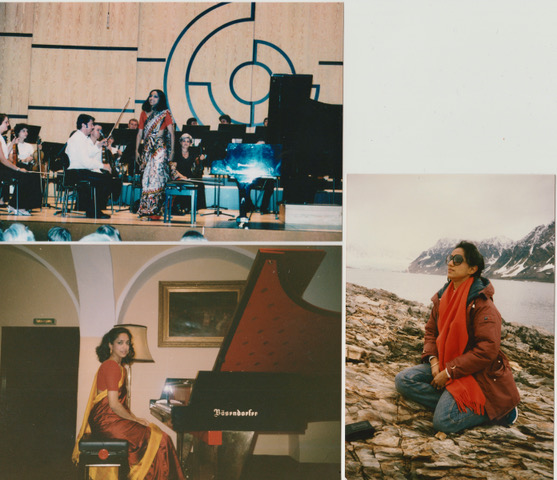Music My Life – From Bombay to the world

“I was born and brought up in Bombay, I still say “Bombay” because for me, right through my happy youth and till now, it is the best city in the world!”. Dr. Marialena Fernandes has earned her stripes on the international music scene not only as a concert pianist but also as a professor and a philosopher. Born in Mumbai, and sharing her birthday with Wolfgang Amadeus Mozart, music runs in her veins. One of four sisters and one brother, Dr. Marialena acquired her Licentiate Diploma of the Royal Schools of Music (LRSM), and completed her graduate education from the Mumbai University in Psychology and Philosophy. The subject of her thesis was the ‘Konkani song: Roots-Development-Documentation’.
Fernandes studied with the renowned concert pianist Madame Olga Craen, herself a student of the immortal Alfred Cortot. It was the decade-long tutelage of Olga Craen that lit and fanned the fire of music in this budding pianist. It was at the insistence of her guru, that she participated in a competition which brought her to Germany in 1970. The event was organised to commemorate the 200th birth anniversary of Ludwig Van Beethoven. It does not come as a great surprise that young Marialena won the event and a scholarship that took her to the Bavarian city of Munich in 1971. “I was terribly homesick. But I refused to admit it because I thought my father would get me married if I returned back to Bombay.” Her professor of music in Munich was instrumental in charting Fernandes’ move to Vienna. Once again, on yet another scholarship, through the recommendation of her professor, Fernandes was enrolled in the University of Music and Performing Arts, (at that time still Academy of Music and Performing Arts). On the 25th January 1971, from the warm coastal weather of Bombay to the biting -25C cold of Vienna, began a new chapter in Fernandes’ life. At first, she lived at a hostel run by nuns that also housed a small grand piano in a freezing cold room. The rather defunct and unused piano became Fernandes’ best friend and security blanket. “I had no idea what cold was about, but it was this piano which kept the heat in my bones and in my body.”

“You cannot deny your roots. And the roots are, the traditions you grow up with, the genes you receive from your parents and ancestors. These are privileges I got from my parents”. Fernandes grew up in a warm and welcoming household. “There was always laughter, humour, joy and outspokenness at home.” Her mother was an ardent piano teacher and her father was a structural engineer. Her paternal lineage can be traced back to Goans who were exiled 500 miles down south to Mangalore in the 17th century during the rule of the Portuguese. Her father, thus, grew up in an indigenous environment where the people spoke many dialects of the local languages, although they followed Catholicism. This comes in stark contrast to her maternal ancestry influenced first by the Portuguese and then by the British. From their western attire of dresses to their taste in western music, her mother’s family lent Fernandes the European impact in her life. “My mother was a passionate musician and she was my first role model and idol. Mother had only two loves – her religion and her music (besides her family of course).” Taking to the piano came naturally to Fernandes. “I was probably 2 or 3 years old, whilst in the kitchen, I overheard my mother play a black note (most likely a C Sharp) which at that age I could not recognize so I screeched. Mother, who obviously found that strange, decided for a whole year, to check me out and would randomly play various black notes, at which every single time I would respond with a scream”, she reminisces. At the very tender age of 4 years, Fernandes took her first musical exam. She not only passed but topped the Indian rank. “I never played with dolls much to the dismay of my sisters. I would come home from school and run to the piano. Soon did I realize I was playing with the piano.” But the journey to becoming a professional pianist has been fraught with challenges. “First it was the weather and then it was the language and don’t forget the spartan lodgings at the hostel”, Fernandes quips. “I would only feel warm with my piano and that feeling has never left me”. Back then, the scholarship barely covered most living expenses and Fernandes took on part time jobs babysitting for Indian families through the Indian Embassy in Vienna. “To be a pianist is the loneliest part of one’s life. One just has to practice. I did nothing else for 6-8 hours a day till I finished my diploma (with unanimous distinctions)” she admits. Even today, despite having performed on the global music stage on numerous occasions, Fernandes likens the experience to that of a trapeze clown at a circus. “When I say clown, you have to be able to hang on to that rope that is 50 metres high and when your pants fall down, everyone in the audience is laughing, but only you know you have the endless discipline you need to be able to achieve that and still survive. This is particularly true of the arts. To be a performer, most of our work is live on stage and on the spot. A painter or a writer can take his or her time to perfect the work. It is just that one moment, that one hour that counts. There again you may play 99 notes correctly but people will talk about the 1 erroneous note. Either I let this affect me and I give up and go sell shoes or I make the most of that one wrong note and build on it.” This is the knowledge and experience of over 35 years that Fernandes imparts to her students as professor at the University of Music and Performing Arts Vienna.
During the pandemic, Fernandes has been visiting people’s homes for a new initiative called Concert For Two or Concert For You where she performs musical pieces for those who appreciate western classical music over a home cooked meal. “I sing for my supper and enjoy communicating through musical dialogue”, she jokes. But, interestingly enough, Fernandes has turned this concept upside down, by gradually assuming the role of the passive player, while letting her patrons become the active thinkers and doers. All this happens, by inevitably peppering in some mirch masala into her performances. “I smuggle in bits of opera, operetta or pop in the midst of e.g. a Mozart/Beethoven Sonata. Soon I find the rather conservative listener bursting into guess work, where the musical gag could in fact be hidden!”
Over the past 7 years, Fernandes has also been actively involved in a social project “The Quest for Passion”, focusing on musical knowledge in Portuguese colonized India. This covers the cities of Bangalore, Mangalore and Goa. Pre-pandemic, Fernandes along with a handful of select European students would conduct masterclasses, workshops and performances in these cities with a conscious intention of interaction. But these trips to India weren’t purely about conveying music. Athletics, in particular football and gymnastics, were also an integral part of the project. This context is another form that gives children and teens the opportunity to display their musicality, particularly in terms of how they deal with movement through rhythm.

“There are three things I tell my students to remember – you can have a dream, but when that dream becomes a vision, then the vision becomes a mission. I believe very strongly in divine guidance. This has nothing to do with any religious denomination. I follow and accept the signs I keep getting. Philosophy of religion and sociology is probably that spiritual motivator that has kept me alert. Life is a journey, we all are enroute and have the privilege to choose a way which is good for us. Through my years of artistic experience as performer and educator, I tend to believe in diagnosis and therapy”, says Dr. Fernandes of her success and her vocation as a professor. “I live to perform and I perform to live. Every time I play, it’s like my doing it for the first time. I definitely try to identify with my audience and integrate their emotions into my performance. Interaction is a major part of my musical life. I do not want an audience that passively consumes my music”, admits Fernandes who has even performed in Spitzbergen (bordering the Arctic Ocean).

Circling back to Fernandes’ maximum city of Bombay, she says, “I never feel like I really left Bombay or home. My childhood in Bombay afforded me the opportunity to share friendships with Hindus, Muslims, Jews, Parsis and all other communities. It was always the human being behind the religion that mattered.
“It has been 50 years since I left India but it feels like just yesterday.”
On a parting note, Fernandes leaves our readers with this message, “I am fully convinced that the idea and conception behind a united South Asian Orchestra is the perfect solution for otherwise considered handicaps. The power, strength and universality of music imbibes feelings within us through which we can communicate even without words or language. Sound does something inexplicable to us like the cry of a newborn.
To quote the famous English conductor, Leopold Stowkowski, ‘A painter paints pictures on canvas. A musician paints his pictures in silence’.”
This article first appeared in “Accord”, the journal of The South Asian Symphony Foundation, Bangalore.





